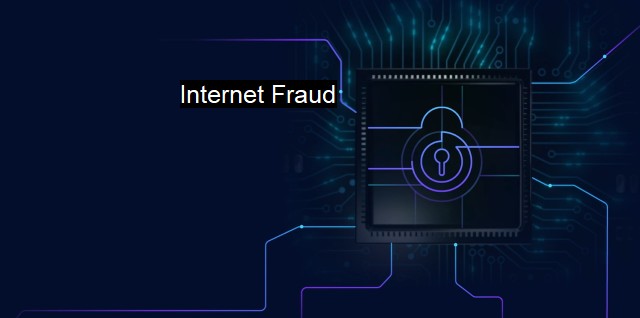What is Internet Fraud?
Unmasking the Threat: Understanding Internet Fraud and its Variants - A Comprehensive Look at Malware, Phishing Scams, and Cyber Security Measures
Internet fraud is a term widely used to refer to any type of fraud scheme that uses one or more online services to present fraudulent solicitations or conduct fraudulent transactions. This form of cybercrime often involves using the internet to communicate false or fraudulent representations to victims, thereby persuading them to part with funds, credit card details, or other valuable property. The rapid development and global proliferation of the internet across various domains of life have augmented both the vulnerability of individuals to such fraud and the capability of perpetrators to devise intricate scams.Various types of internet fraud exist, including phishing, email spoofing, identity theft, lottery scams, Nigerian 419 scams, and more. Phishing involves sending e-mails that appear to be from legitimate organizations, often banks, to obtain personal information and financial details. The email often includes a link that takes the recipient to a fabricated website mimicking the real one, tricking victims into entering their banking details or personal information.
Email spoofing remains another form of internet fraud. Here, email headers are manipulated to appear as though the email originated from a different source. This form of fraud is often used in conjunction with phishing or as a part of larger cyber-attacks.
Identity theft is another prevalent form of internet fraud. It involves the theft of personal data, such as national identity numbers, credit card details, bank account details, passwords, among others, to impersonate a person. The stolen data can then be used for fraudulent online transactions, unauthorized financial withdrawals, blackmail or even sold on the dark web.
Nigerian 419 scams, also known as advance-fee frauds, trick victims into providing money with the lure of a significant reward. The lottery scam, on the other hand, fools the victims into believing they have won a huge amount of money. To claim the “prize,” the victims are usually asked to pay processing costs or taxes.
In the cybersecurity context, internet fraud schemes remain a significant issue. Organizations are increasing their security measures to defend against these online scams. Cybersecurity software, including firewalls, antivirus software, and other security applications, has become part and parcel of any protection strategy. These component software mitigate malware, help ward off phishing attacks, and guard against identity theft by tightening security portals and increasing data encryption.
Antivirus application prevents threats at a primary stage by detecting and eliminating malicious software. These software often come equipped with email scanners to scrutinize emails for phishing and fraudulent logics. They can readily identify known malware patterns and have heuristic analysis capabilities to detect unfamiliar threats based on the behaviour of programs or files.
Other cybersecurity measures include two-factor authentication (2FA), biometrics, and traffic encryption, each designed to add an additional layer of protection against internet fraud. human actions remain as essential as technological measures in combating internet fraud. Educating both the individual and institutional internet users about cyber threats, vigilant internet usage, including identifying deceptive emails and using secure websites for online transactions, is crucial.
Internet fraud remains a serious cybercrime with dire implications for individuals and organizations alike. Cybersecurity and antivirus have been essential tools in laying down diagnosis, protection, and mitigation measures against this crime. regular educational efforts aimed at improving the knowledge of users about the different types of threats and precautionary measures to take when operating online are equally vital. Only by combining technological innovations and improved human behaviour can we hope to combat the rising scourge of internet fraud.

Internet Fraud FAQs
What is internet fraud?
Internet fraud refers to any illegal activity where a criminal uses the internet to deceive victims into providing sensitive information or transferring money or property.What are some common types of internet fraud?
Some common types of internet fraud include phishing scams, identity theft, online auction fraud, credit card fraud, and malware scams.How can I protect myself from internet fraud?
To protect yourself from internet fraud, make sure to use antivirus software, be cautious of suspicious emails or messages, never provide sensitive information to unknown sources, and only make purchases from reputable websites.What should I do if I become a victim of internet fraud?
If you become a victim of internet fraud, immediately report the incident to the authorities, contact your bank or credit card company to report any fraudulent charges, and monitor your accounts closely for any additional suspicious activity.| | A | | | B | | | C | | | D | | | E | | | F | | | G | | | H | | | I | | | J | | | K | | | L | | | M | |
| | N | | | O | | | P | | | Q | | | R | | | S | | | T | | | U | | | V | | | W | | | X | | | Y | | | Z | |
| | 1 | | | 2 | | | 3 | | | 4 | | | 7 | | | 8 | | |||||||